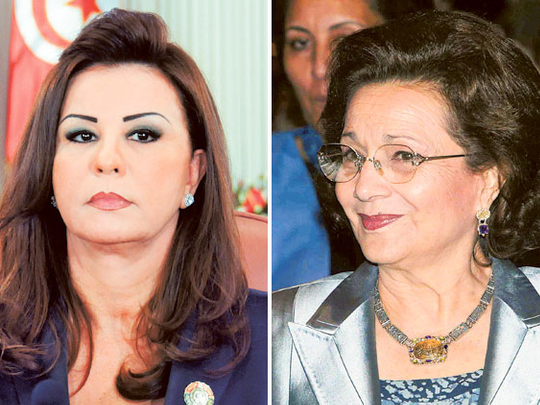
Dubai: The Arab spring has brought a new phenomenon to the region: former first ladies are publishing their memoirs to audiences who have mixed feelings about reading what the once-powerful women have to say.
Leila Taraboulsi, wife of the deposed Tunisian leader Zine Al Abidine Bin Ali, broke her silence and published her memoir recently. There was a rumour that Suzan Mubarak, wife of jailed Egyptian president Hosni Mubarak, will follow suit, but that was denied. And specialists say she has no time, at least at present, to write about her past as her husband and two sons are in jail on several charges.
“Their memoirs are very important,” said Farouk Abu-Zeid, a veteran Egyptian media expert, on the former first ladies memoirs. “Especially those of Leila Taraboulsi. These memoirs will be part of Tunisia’s history. Also, surely people will be interested in knowing the perspective of the first lady who spent a long time ruling Egypt,” he added. “Suzan Mubarak has had a very active role in Egyptian life for nearly 30 years, and her memoirs, if written, will be of a great importance whether factual and real or not,” Abu-Zeid told Gulf News.
According to reports posted online last year, Suzan has agreed with British publisher Canongate to publish her memories for £10 million (Dh57.60 million).
The reports, which were based on an article published in the Egyptian magazine Rose al Yousef, said the title of the book is “Egyptian First Lady: 30 years on Egypt’s crown” and was translated by a veteran translator in London.
However, when contacted by Gulf News, Canongate denied the “rumours”, adding they “don’t know its source”.
Abu-Zeid also explained that “we have not heard or read that Suzan is waiting to write her memoirs. Notice that currently she has no time to write or even think…but if the circumstances change, and the family affairs become stable, there is a possibility that she could write.”
If they were written, Aou-Zeid expects a large appetite by ordinary people for answers to questions they have which only Suzan has answers to.
“For example, has she really encouraged her son [Jamal] to prepare to become president? And has she pressed her husband to arrange for passing on power to their son?.... there are many things we need to know.”
While the debate on Suzan Mubarak continues, Leila released last June her book “My Truth” in France.
The memoirs of the 55-year-old unpopular woman, whose family was believed to have had a strong grip on business in the country, were based on interviews given on Skype to French journalist Yves Derai.
Leila Bin Ali blamed her husband’s chief of presidential security Ali Seriati, currently in jail, of being behind a “plot” that led to the uprising, which sparked the Arab Spring revolts.
She outlined the stages: “indoctrination of the masses, the distribution of money in poor areas, the recruitment of snipers, the intensification of protests through targeted killings, the torching of homes.”
Their flight into exile to Saudi Arabia would not have occurred “without Seriati’s insistence,” she said, adding: “Even once we were in the air, my husband thought he could return the following morning.”
Yet, Leila Bin Ali said she and her husband were ready to face trial back home if “we are guaranteed the impartiality of the judgements and assured of the legitimacy of those in charge” of the trial.
In the book, she is believed to prefer to remain tight-lipped on her family’s exile in Saudi Arabia. “The major part of the day looking after my husband and my children... I go out rarely, hardly meet anyone and pray a lot,” she wrote.
Some ordinary people showed interest in knowing the nitty-gritty of Laila’s life and what exactly happened on January 14 — the day her husband was deposed and left the country. But others were quoted as describing her book as a “series of lies”, to the extent that some bookstores in Tunisia opted not to sell it
But to Abu-Zeid, “only history will judge whether any memoirs are true or not.”
Memoirs of figures who have a political and social dimension, such as Leila Taraboulsi and Suzan Mubarak are usually very interesting, and carry “part of the truth, and part of fantasy”, unlike the memories of society’s celebrities that are usually “closer to gossip”, Abu-Zeid explained.
However, writing memoirs by political figures in the Arab region is not a deep-rooted tradition or a widely-spread phenomenon, in contrast to western culture.
“This tradition doesn’t exist either among women nor men,” Abu-Zeid said.
For example, “all of Egypt’s rulers and king didn’t write their memoirs,” adding that Jamal Abdul Nasser, “the most prominent Arab political figure in the second half of the past century” didn’t leave his memoirs and many questions related to his life and death are still left with no answers.
In response to a question on why Leila and not her husband took the initiative to write their perspective of what happened, Abu-Zeid said this is related to health condition, physiological readiness and the courage to write. But, “by nature, women like more to show off than men….. So what would stop her [any woman] from writing if she has the strong personality.”
“Remember Leila and Suzan were not ordinary women.”












